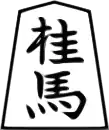桂馬
Japanese
| Kanji in this term | |
|---|---|
| 桂 | 馬 |
| けい Jinmeiyō |
ま Grade: 2 |
| kan’on | kan’yōon |

Etymology
From Middle Chinese-derived elements 桂 (kei, “Chinese cinnamon, laurel”) + 馬 (ma, “horse”).
Noun
桂馬 • (keima)
- (shogi) a cassia or laurelled horse (piece that can move two spaces forward then one space left or right), erroneously called in most literature as the equivalent of the “knight” in Western chess[3]
- Synonym: 桂 (kei)
- (by extension of the cassia horse’s movement) a quibble, sophistry, or other incoherent argument
- Synonym: 屁理屈 (herikutsu)
- (go) a stone placed orthogonally similar to how a keima in shogi or knight in Western chess moves from another stone of the same color
- such a move with one stone is called a 小桂馬 (shō-geima)
- such a move done with two stones (may be in succession) is called a 大桂馬 (dai-geima)
See also
| Shogi pieces (将棋の駒) | |||||||||
|---|---|---|---|---|---|---|---|---|---|
| Unpromoted (生駒) |
name | 王将 玉将 |
金将 | 銀将 | 桂馬 | 香車 | 飛車 | 角行 | 歩兵 |
| abbr. | 王 玉 |
金 | 銀 | 桂 | 香 | 飛 | 角 | 歩 | |
| Promoted (成駒) |
name | - | - | 成銀 | 成桂 | 成香 | 竜王 | 竜馬 | と金, 成歩 |
| abbr. | - | - | 全* | 圭* | 杏* | 竜 | 馬 | と, 止 | |
| *These 3 abbreviations are only used as a typographical convention. They are pronounced the same as their full names. | |||||||||
Proverbs
References
- NHK Broadcasting Culture Research Institute, editor (1998), NHK日本語発音アクセント辞典 [NHK Japanese Pronunciation Accent Dictionary] (in Japanese), Tōkyō: NHK Publishing, →ISBN
- Matsumura, Akira, editor (2006), 大辞林 [Daijirin] (in Japanese), Third edition, Tōkyō: Sanseidō, →ISBN
- 2002, Ineko Kondō; Fumi Takano; Mary E Althaus; et. al., Shogakukan Progressive Japanese-English Dictionary, Third Edition, Tokyo: Shōgakukan, →ISBN.
This article is issued from Wiktionary. The text is licensed under Creative Commons - Attribution - Sharealike. Additional terms may apply for the media files.